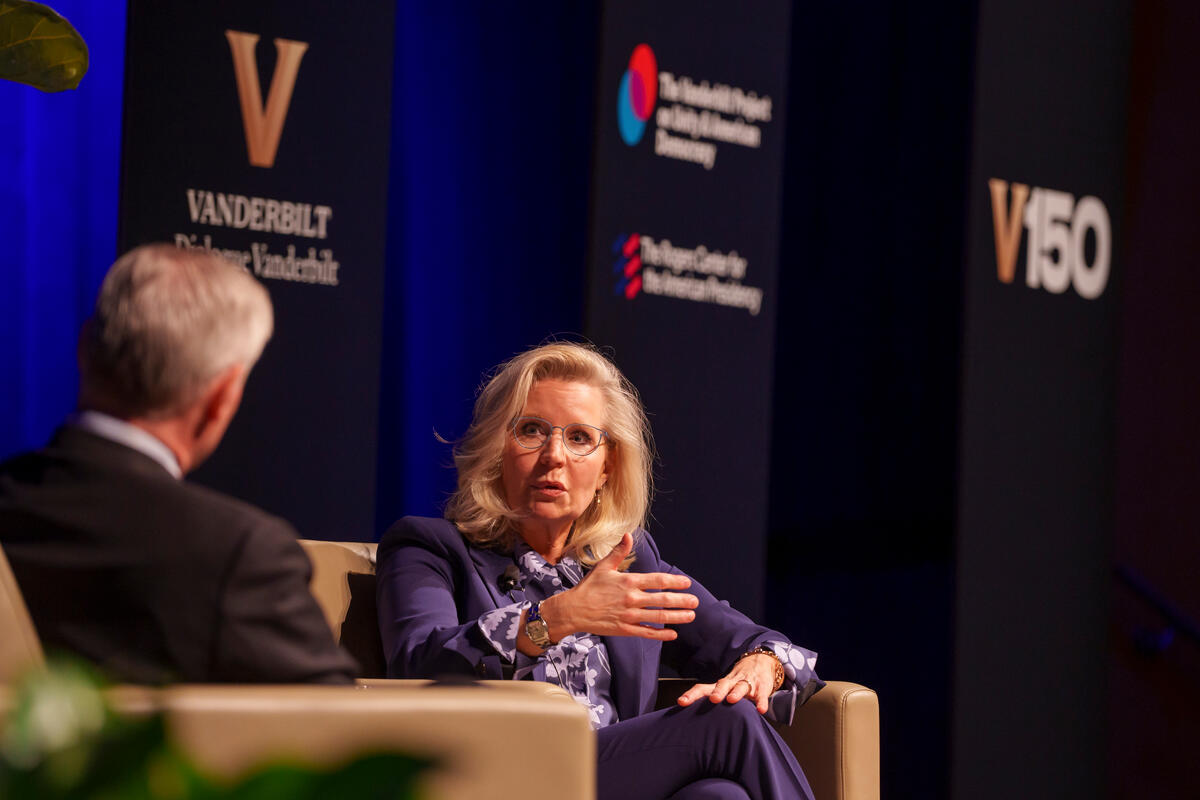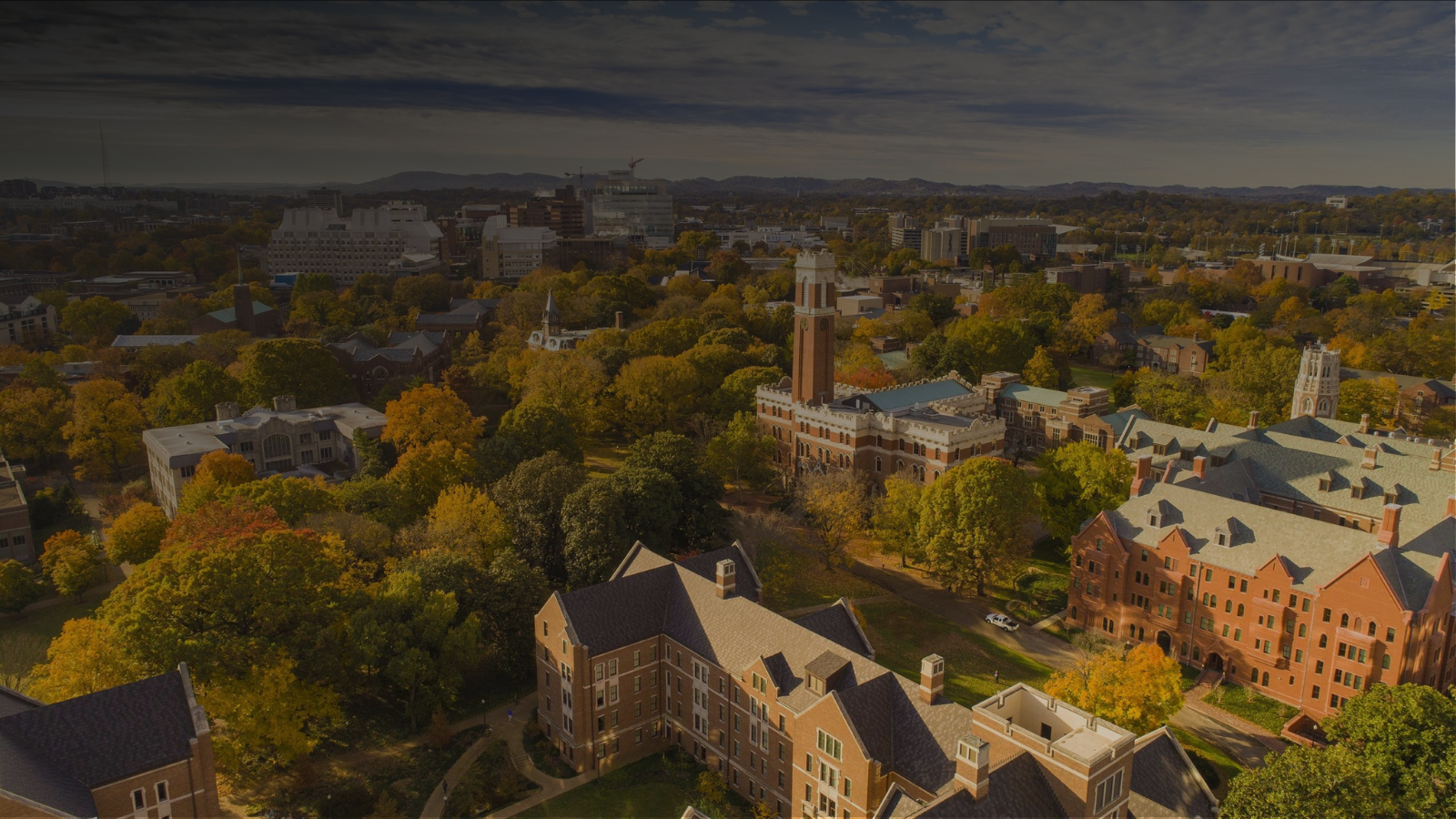In August 2023, the university launched Dialogue Vanderbilt, its core initiative to bridge divides, reestablish a vibrant culture of civil discourse and free expression, and showcase experts from on campus and around the world, leading the charge to build more engaged citizens and communities.
Including the Vanderbilt Project on Unity and American Democracy, the Future of Free Speech, the Open Dialogue Visiting Fellows program and the new Advocacy, Debate and Dialogue Lab for Civic Education, Dialogue Vanderbilt engaged in a wide range of topics and activities. These distinct, but interconnected, programs explored the definition and boundaries of free speech domestically and globally, brought myriad policymakers, nonprofit, corporate and faith leaders, journalists, academics and others to campus to model civil discourse on a range of challenging topics and mentor our students during and after their visits. They provided our faculty and students with tools and opportunities to roll up their sleeves and practice civil discourse across difference through innovative pedagogy, debate and other unique experiences.
At the center of Dialogue Vanderbilt are our students. Students engaged in Dialogue Vanderbilt programming in many ways, as described further below; yet, perhaps most significantly, approximately 20 students were selected from a competitive pool to serve as Dialogue Vanderbilt ambassadors, and we expect that the number of Dialogue Vanderbilt ambassadors serving on what will be called the Student Advisory Board will nearly double in the coming semester.
As for the specifics of the 2023–24 Dialogue Vanderbilt programming, in September, the Open Dialogue Visiting Fellows program welcomed Sigal Ben-Porath from the University of Pennsylvania to engage directly with the Vanderbilt community and discuss democratic theory, civil discourse in universities and her book Cancel Wars.
October marked Vanderbilt’s inaugural Free Speech Week, beginning with Jenn Carlson from Arizona State University, who led a discussion on college firearms and student safety. Jacob Mchangama opened Future of Free Speech’s Symposium on AI, Free Speech and Human Rights, emphasizing the importance of addressing generative AI with caution and optimism. MIT professor Max Tegmark delivered a keynote on the nonpartisan importance of free speech for democracy and scientific truth. Free Speech Week concluded with a fireside chat between Vanderbilt faculty member Samar Ali and New York Times columnist Bret Stephens on the significance of free speech and engaging with challenging ideas.
Free Speech Week took place in the direct aftermath of the Oct. 7 Hamas attack on Israel and the ensuing war and deaths in Gaza, testing the university’s commitment to free and open dialogue while maintaining institutional neutrality in emotionally charged moments. That commitment held firm and echoed through the rest of the academic year, which saw civil, productive conversations as other university campuses succumbed to further polarization.
In November, the Open Dialogue Visiting Fellows program concluded its first semester featuring Maria Hinojosa, a renowned journalist and producer of Latino USA/Futuro Media, the Texas Tribune and PBS’s Frontline program. Her insightful discussion of the modern political landscape and her impactful work in public broadcasting left the audience inspired and well-informed.
The Vanderbilt Project on Unity & American Democracy partnered with Nashville Public Television to feature the Unity Project in a multipart series for digital and broadcast consumption. NPT created six 10-minute digital episodes for various platforms, a 60-minute broadcast special and a 30-minute panel discussion for broadcast.
The documentary highlighted co-chair John Geer, senior advisor to Chancellor Daniel Diermeier, co-chairs Jon Meacham, Samar Ali and Bill Haslam, and Dialogue Vanderbilt student ambassadors who described the project’s goals and accomplishments over the past several years.
Select faculty who taught in fall 2023 pilot courses for the new Arts and Science curriculum also participated in a workshop session led by Dana Nelson about integrating open dialogue in the classroom. In this session, instructors explored assignments and tools for democratic discussion, including the Gapminder web tool, quizzes on false polarization and resources from the Constructive Dialogue Institute. Nelson, Nancy Perot Chair of English and professor of American studies, has been developing a pedagogy to help students learn how to engage dialogue, debate and research on difficult/controversial topics, with openness, intellectual humility and an expansive curiosity. She launched this effort in response to her growing concern that political tribalization and social media and media algorithms were increasingly deskilling our students for the work of difficult conversation. As part of her developing efforts to build out this pedagogy, she offered courses on topics like Why Argue about Climate Change? and Why Argue about Politics?
NPT also promoted the Democracy Minute and related materials to the PBS Learning Media platform, a resource that provides free, curriculum-aligned videos, interactive resources and lesson plans for teachers. In the upcoming school year, this resource will be distributed across the South and beyond.
Daniel Ardity, Maya Reddy, Ainsley Gill and Zacarias Negron from the Debate Team traveled to Ho Chi Minh, Vietnam, in December to participate in the World Universities Debating Championship. This competition is recognized as the largest college debate competition in the world and hosts more than 400 teams from around the globe. Throughout the year, the Debate Team also hosted the U.S. Air Force Academy and the Rwandan debate teams for competitions on campus.
In January, the Unity Project welcomed Rabbi David J. Wolpe for the first conversation in a series about faith with leaders of various religious backgrounds. Dean Yolanda Pierce of the Divinity School moderated the discussions, which covered a wide range of topics, including the role of faith in democracies and how faith can shape one’s views of the world. The conversation continued throughout the spring semester with Maha Elgenaidi, founder and executive director of the Islamic Networks Group, and Don Abram, founder of Pride in the Pews, adding more depth to the exploration.
On Feb. 6, the Unity Project sold out Langford Auditorium for a fascinating conversation between former U.S. Representative Liz Cheney and Jon Meacham. They discussed the vital importance of efforts such as Dialogue Vanderbilt to fortify cultures of civil discourse and respect for democratic institutions. She offered these inspiring parting words: “Let us all, as we leave here tonight, resolve that we will embrace the grace, compassion and the love of country that unites us. Let us resolve that we will fight to do what is right and that we will be able to look back on this day and say in our time of testing, we did our duty, and we stood for truth.”

Throughout the spring semester, Open Dialogue hosted three impressive visiting fellows. Jonathan Rauch, senior fellow at the Brookings Institution, explored “Why Free Speech Is the Only Safe Space for Minorities.” That conversation was built upon by Melissa Harris-Perry, founder and president of the Anna Julia Cooper Center and co-creator and co-host of System Check, for a conversation on the challenges and opportunities in fostering diversity and inclusion on university campuses. Finally, Anne Applebaum brought a global lens and pointed it back on Tennessee to speak with Meacham on the rise of authoritarianism at home and abroad. Each of these visiting fellows spent a significant amount of time on campus participating in larger public events and a number of more intimate conversations with groups of Dialogue Vanderbilt ambassadors and other students.
The Unity Project also held a series of conversations this spring with current and former diplomats from geopolitically vital countries around the world. Oksana Markarova, Ukrainian ambassador to the U.S., Michael Herzog, Israeli ambassador to the U.S., and Salam Fayyad, former prime minister to the Palestinian Authority, engaged students about deeply complex and diverse issues facing their respective nations. “I think this is the only university in the country that can host Salam Fayyad one day and the Israeli ambassador the next,” Morgan Ortagus, former spokesperson for the U.S. Department of State, told students as she led the conversation with Herzog.
In addition to events hosted by the Unity Project, Geer also continued to lead nationally recognized polling efforts that contribute facts and evidence to the country-wide conversation around democracy and civil discourse through the Vanderbilt Poll, the Unity Poll and the Vanderbilt Unity Index. From the VUI, the amount of unity in this country showed its first uptick in more than a year, with a modest increase of 0.4 from 46.4% to 46.8% in the most recent Vanderbilt Unity Index. This slight increase is somewhat surprising given a contentious Republican primary, a combative Congress and growing uncertainty in the Middle East.
The Advocacy, Dialogue and Debate Lab had a very active semester in the spring. Among the highlights was the ADD Lab’s partnering with the Vanderbilt Political Review, the College Democrats and College Republicans to sponsor the first debate between the College Democrats and College Republicans in a number of years. The debate, focused on gun policy, was attended by more than 100 students. The success of the debate experience has spurred the College Democrats and College Republicans to agree to a series of monthly debates in the fall leading up to the 2024 presidential election. leading up to the 2024 presidential election.
In addition to all of these programs, students participated in listening sessions with the Bush Institute and Interfaith America, assisted in the development of national polling efforts, spoke with famed authors James Patterson and Laura Pappano, and encouraged their classmates in respectful debates across the partisan divides.
Dialogue Vanderbilt is excited to bring to campus and the greater Nashville community a jam-packed year in 2024–25.







